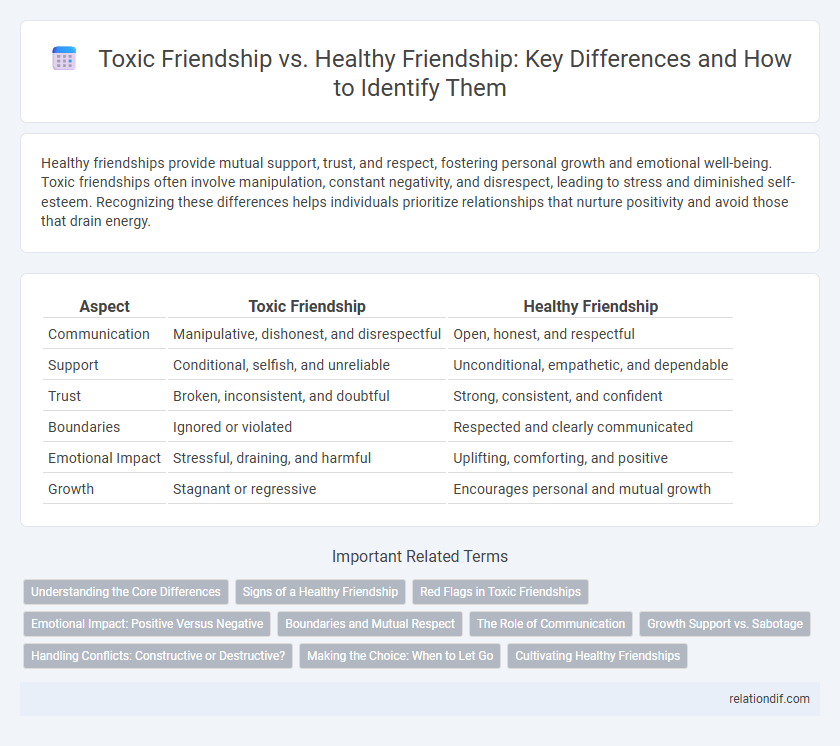Healthy friendships provide mutual support, trust, and respect, fostering personal growth and emotional well-being. Toxic friendships often involve manipulation, constant negativity, and disrespect, leading to stress and diminished self-esteem. Recognizing these differences helps individuals prioritize relationships that nurture positivity and avoid those that drain energy.
Table of Comparison
| Aspect | Toxic Friendship | Healthy Friendship |
|---|---|---|
| Communication | Manipulative, dishonest, and disrespectful | Open, honest, and respectful |
| Support | Conditional, selfish, and unreliable | Unconditional, empathetic, and dependable |
| Trust | Broken, inconsistent, and doubtful | Strong, consistent, and confident |
| Boundaries | Ignored or violated | Respected and clearly communicated |
| Emotional Impact | Stressful, draining, and harmful | Uplifting, comforting, and positive |
| Growth | Stagnant or regressive | Encourages personal and mutual growth |
Understanding the Core Differences
Toxic friendships often involve manipulation, lack of support, and consistent negativity, undermining personal growth and emotional well-being. Healthy friendships are built on trust, mutual respect, open communication, and encouragement that fosters confidence and happiness. Recognizing these core differences helps individuals set boundaries and cultivate relationships that contribute positively to their mental health.
Signs of a Healthy Friendship
Signs of a healthy friendship include mutual respect, open communication, and genuine support during both successes and challenges. Friends in healthy relationships respect boundaries, actively listen, and encourage personal growth without judgment. Positive interactions build trust, foster emotional safety, and create a balanced dynamic where both individuals feel valued and understood.
Red Flags in Toxic Friendships
Toxic friendships often present red flags such as manipulation, constant criticism, and lack of support, which can drain emotional energy and self-esteem. Healthy friendships are characterized by mutual respect, open communication, and genuine care that foster personal growth and trust. Recognizing early warning signs like jealousy, dishonesty, and one-sided effort is crucial to maintaining positive and balanced relationships.
Emotional Impact: Positive Versus Negative
Healthy friendships foster emotional support, trust, and mutual respect, enhancing self-esteem and overall well-being. Toxic friendships often cause stress, insecurity, and emotional drain, leading to anxiety and decreased mental health. Identifying the emotional impact helps distinguish genuine connections from harmful relationships.
Boundaries and Mutual Respect
Toxic friendships often lack clear boundaries, leading to manipulation and emotional exhaustion, while healthy friendships establish and honor personal limits that foster trust and comfort. Mutual respect in healthy friendships ensures that both parties feel valued and understood, contrasting with toxic dynamics where disrespect and disregard for feelings prevail. Prioritizing boundaries and mutual respect strengthens connections and promotes positive emotional well-being.
The Role of Communication
Effective communication is the cornerstone of healthy friendships, fostering trust, empathy, and mutual understanding. In toxic friendships, communication often involves manipulation, criticism, and neglect of boundaries, leading to emotional distress and imbalance. Consistent, honest dialogue supports growth and resilience, distinguishing supportive relationships from harmful ones.
Growth Support vs. Sabotage
Healthy friendships foster personal growth through mutual support, encouragement, and open communication, creating a positive environment where both individuals thrive. Toxic friendships, in contrast, involve manipulation, jealousy, and sabotage, undermining self-esteem and hindering emotional development. Prioritizing supportive relationships enhances resilience and overall well-being, while distancing from toxic influences cultivates a healthier social circle.
Handling Conflicts: Constructive or Destructive?
Handling conflicts in healthy friendships involves open communication, active listening, and mutual respect, fostering growth and understanding between friends. Toxic friendships often escalate conflicts through manipulation, blame, or avoidance, leading to emotional distress and resentment. Constructive conflict resolution strengthens bonds, while destructive patterns erode trust and damage the relationship over time.
Making the Choice: When to Let Go
Recognizing the signs of toxic friendship, such as consistent disrespect, manipulation, or emotional drain, is crucial for preserving mental health. Healthy friendships foster mutual support, trust, and positive communication, promoting personal growth and well-being. Making the choice to let go involves prioritizing one's emotional safety and surrounding oneself with relationships that uplift rather than diminish.
Cultivating Healthy Friendships
Cultivating healthy friendships involves mutual respect, open communication, and consistent support that fosters emotional growth and trust. In contrast to toxic friendships characterized by manipulation, negativity, and imbalance, positive relationships encourage vulnerability and celebrate individual boundaries. Prioritizing empathy and active listening strengthens connections, creating a foundation for long-lasting and fulfilling bonds.
toxic friendship vs healthy friendship Infographic

 relationdif.com
relationdif.com